Greyhound races up 'due to streaming and betting'
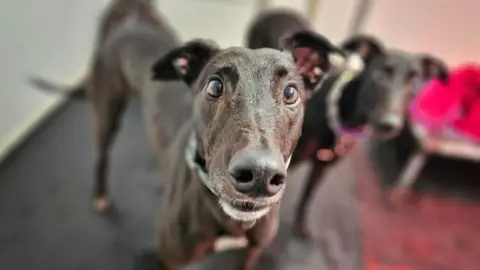 Greyhound Rescue Wales
Greyhound Rescue WalesStreaming and betting are driving up the number of greyhound races in Wales, animal welfare campaigners have said.
Greyhound Rescue Wales said streaming had played a big part in the “uplift” in races at Wales’ only track, Valley Stadium, which was licensed last year.
But the Greyhound Board of Great Britain (GBGB), the regulator for licensed greyhound racing, said the increase was due to the track becoming regulated, with formal safeguards and welfare measures now in place.
The Welsh government is expected to publish its response to a consultation, which looked at a phased ban on greyhound racing, this autumn.
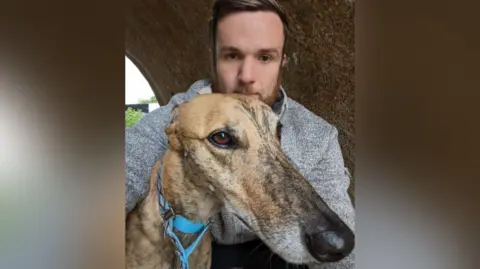 Tim Doyle
Tim DoyleTim Doyle, the chief executive of Greyhound Rescue Wales, said the "main output of the Valley track, like most tracks in the UK, is to serve live streaming contracts”.
He said the Valley Stadium, in Hengoed, Rhymney Valley, which was licensed by GBGB in August last year, held 42 races in November 2023 compared with 168 races last month.
“A lot of people have this rose-tinted view of greyhound racing as a night out at the dogs [and] that the tracks are packed with people of an evening," said Mr Doyle.
“That's not really where the majority of business is coming from."
Mr Doyle said the industry had been steadily declining for the last 20 years, but he feared the streaming business model would keep it "clinging on" for longer.
His organisation has been working with Gamban, a software that people can download to block gambling sites, to call for an end to greyhound racing in Wales.
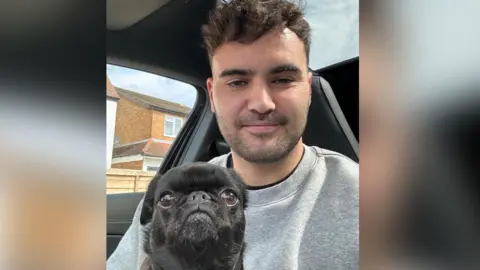 Matt Zarb-Cousin
Matt Zarb-CousinOne of Gamban's founders, Matt Zarb-Cousin, described greyhound racing as "antiquated" and said races had become no more than "random betting events”.
"It's an industry that unfortunately derives far too much of its revenues from people with gambling problems,” Mr Zarb-Cousin said.
He criticised the gambling industry for the harm he said was caused to animals and people as part of its “pursuit of profit”.
Both he and Mr Doyle raised concerns over the welfare of the animals and the regulation of the industry.
"It's not regulation, it's self-regulation; it's regulated by the industry itself," Mr Doyle said.
He pointed to GBGB figures which showed some 2000 greyhounds died and there were more than 18,000 injuries on regulated tracks between 2018 and 2021.
The GBGB said the fatality rate at tracks halved in the same period due to measures put in place to improve welfare.
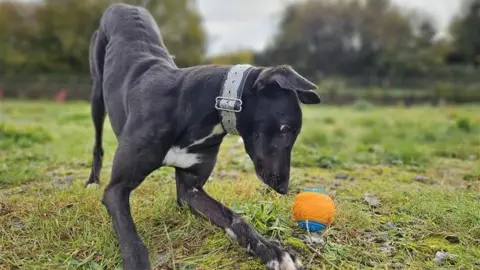 Greyhound Rescue Wales
Greyhound Rescue WalesMr Doyle said it was increasingly difficult to rehome greyhounds due to a "stagnation" in the number of people coming forward.
This, he said, was due to the cost-of-living crisis and fears over rising vet bills.
A Welsh government consultation looking at a phased ban of greyhound racing closed earlier this year. A spokesperson said it was expected to publish its response this autumn.
That came after a petition signed by 35,000 people and a Senedd committee called for a "gradual" end to the sport in Wales.
A petition in support of the sport also generated more than 10,000 signatures at the time.
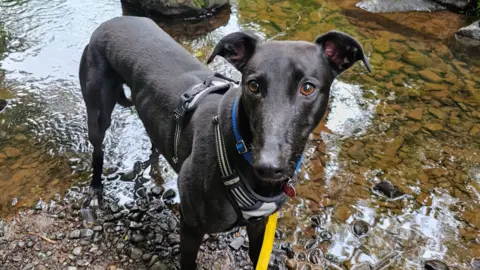 Greyhound Rescue Wales
Greyhound Rescue WalesThe GBGB said the increased activity at Valley Stadium was “about a previously unlicensed track – which had no formal safeguards in place around welfare – becoming regulated in Wales".
It said the track welcomed a “strong, local core of racing enthusiasts who appreciate and enjoy the sport, and importantly, value the measures now in place to protect welfare”.
"There is a vet on site at all times, a national network of experts offering advice and visiting trainers' residential kennels, and an extensive set of rules that ensure racing has the highest standards of welfare and integrity," a spokesperson added.
They said it was because of those standards that "we are proud to uphold that British licensed greyhound racing remains a popular product of choice for broadcasters here and globally – something which… contributes £166 million to the British economy”.
"Online betting on sport involving animals is something that cuts across horseracing, greyhound racing and other sports," they added.
The spokesperson said that if its approach to improving the welfare of greyhound racing by regulating a previously unlicensed track was worthy of "scrutiny and criticism, then the BBC's multimillion-pound spend on horseracing is likewise in the dock”.
Valley Racetrack declined to comment.
A spokesperson for the Betting and Gaming Council, the standards body for the regulated UK betting and gaming industry, said: "We welcome the significant improvement in facilities and standards at the Valley.
"Last year, industry sponsorship for greyhound racing totalled £30,000 while in the same year, our members voluntarily donated over £7m to the British Greyhound Racing Fund for the welfare of greyhounds."
